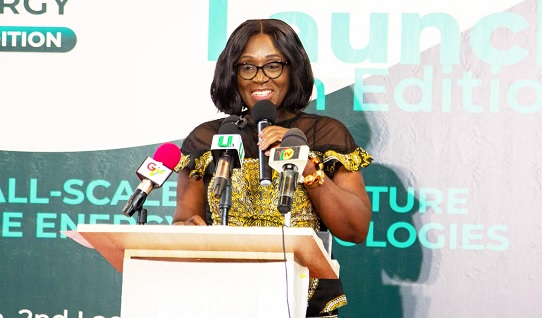
SHSs energy inventions to go commercial "Energy Ministry, CSIR sign MoU"
The Energy Commission and the Council for Scientific and Industrial Research (CSIR) have signed a Memorandum of Understanding (MoU) to develop and commercialise renewable energy inventions by secondary schools.
The MoU will see the two institutions collaborate on a number of activities, including identifying and developing renewable energy inventions by secondary schools and providing technical support to schools to develop their inventions.
Additionally, the inventions would be commercialised through the establishment of a renewable energy incubator.
As a first step, CSIR will develop and commercialise a prototype solar dehydrator invented by students of the Kpedze Senior High School (KPESCO) in the Volta Region.
A solar dehydrator collects energy from the sun to heat air, which, in turn, is used to dehydrate food and agricultural products.
This came to light at the launch of the fourth edition of the Energy Commission’s Senior High School Renewable Energy Challenge in Accra yesterday.
Renewable Energy Challenge
The challenge is a competition for senior high schools (SHSs) to develop renewable energy projects.
It is aimed at promoting the development and efficient use of renewable energy resources through public education, training and regulation of entrepreneurs in the sector.
The fourth edition of the challenge being held on the theme: “Mechanised Small-Scale Agriculture Using Renewable Energy Technologies,” will have participating schools develop projects in the field of agriculture that incorporate renewable energy technologies.
It is being funded by the German Agency for International Cooperation (GIZ), Ashesi University, Bui Power Authority and Sunon Asogli Power (Ghana) Limited.
The schools that qualify from their regional contest to participate in the national, will compete to win a number of prizes, including cash, scholarships and equipment at the national finals slated for October 2023.
Sustainable Agriculture
The Minister of Energy, Dr Matthew Opoku Prempeh, who launched the Challenge, said the government was committed to promoting sustainable agriculture in Ghana.
He said renewable energy could play a key role in sustainable agriculture by providing farmers with a reliable and affordable source of energy.
The minister, in a speech read on his behalf by a Deputy Minister of Education, Gifty Twum-Ampofo, indicated that the partnership offered an opportunity for the two institutions to nurture the innovations while propelling them into remarkable projects towards real-world implementation.
He noted that the rapidly growing global population had seen an increasing demand for sustainable solutions across various sectors, including agriculture.
That, he said, had made it crucial to explore alternative approaches to meet the ever-expanding food requirements while minimising the adverse environmental impacts.
“The concept of mechanised small-scale agriculture utilising renewable energy technologies perfectly embodies this necessity.
“By shifting our attention towards small-scale agriculture, we can establish a decentralised system that empowers farmers with greater control over their production, promotes local food security and enhances rural development,” he suggested.
GES
Also speaking at the event, a Deputy Director-General of the Ghana Education Service, Dr Kwabena Tandoh, said small-scale agriculture played a vital role in feeding communities and contributing to local economies.
“However, these farmers often face significant challenges such as limited access to electricity and reliance on fossil fuels for irrigating farms and this is where renewable energy technologies step in as a game-changer,” Dr Tandoh said.
He expressed the hope that the challenge and other initiatives would help to promote the integration of renewable energy into agricultural practices, ensuring a sustainable future for small-scale farmers.
Germany
The German Ambassador to Ghana, Daniel Krull, in his remarks, said the competition presented innovative and green solutions that could improve Ghana’s environmental challenges and their impact on communities.
“In times of increasing energy prices and growing debts of the sector, renewable energies offer more competitive advantage to supply security and cost-effectiveness,” Mr Krull said.
Energy Commission
The Chairman of the Board of Directors of the Commission, Prof. Ebenezer Oduro-Owusu, said it was important to prioritise education and innovation to ensure the country could catch up with the rest of the world, as “an illiterate society can never develop to compete with super nations.”
He also stressed that the COVID-19 pandemic had shown that Ghana’s food security could be at risk in the event of a disaster if future generations were not educated and encouraged to be innovative.
The Executive Secretary of the Commission, Oscar Amonoo-Neizer, in his welcome remarks, said the idea was to ensure that students would be able to use the country’s natural resources to help find practical solutions to the challenges facing the country.
“Our purpose is to acknowledge and commend the remarkable endeavours of our exceptional students engaged in this Challenge, which revolves around utilising resources from our local surroundings to tackle pressing challenges within our community,” he said.
Mr Amonoo-Neizer expressed the hope that the engagements with the CSIR would ensure the long-term sustainability of the Challenge which would offer an opportunity for students, teachers and schools to reap the benefits from their projects.
